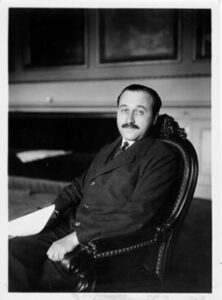Jean Monnet (1880-1979), French businessman, international civil servant and politician.
© Article written by Gabriel Godeffroy for the Central Europe Foundation
 Photo: La Photographie belge, "Jean Monnet", 1920, Archives de la Société des Nations
Photo: La Photographie belge, "Jean Monnet", 1920, Archives de la Société des Nations
Jean Monnet left high school before graduating to work in the family cognac business, for which he traveled the world. During the First World War, Monnet participated in the organization of the war economy, more specifically in the coordination of Franco-British supply efforts in London.
In the aftermath of the war, Monnet was named Deputy Secretary-General of the League of Nations. In this capacity, he organized the International Financial Conference which was held in Brussels in September 1920. He also participated in several missions of the League of Nations, before resigning in December 1922, to work on reorganizing the struggling family cognac business. From 1926, Monnet started a career as an international banker.
Returning to France at the dawn of the Second World War, Monnet participated in the preparation and coordination of the Franco-British and transatlantic armament effort. After the German troops entered Paris in June 1940, he supported the Franco-British Union project. After the fall of France, Monnet was sent to the United States by the British government to negotiate the purchase of war supplies and helped coordinate their war efforts.
After the Allied intervention in French North Africa in November 1942, Monnet took part in the negotiations which led to the creation of the French National Liberation Committee. In Algiers in 1943, he began to think about post-war European unification. As the French Planning Commissioner after the Second World War, Jean Monnet oversaw the economic reconstruction of France. He worked “in the shadows” for the economic unification of Europe and wrote the famous “Schuman declaration” presented on May 9, 1950, which is considered the starting point of the so-called “European construction”.
During the negotiations on the treaty establishing the European Coal and Steel Community (ECSC), Jean Monnet proposed the creation of the European Defense Community (EDC) to the French President of the Council, René Pleven. After the Treaty of Paris came into force in July 1952, Monnet became the first President of the High Authority of the ECSC. The treaty establishing the EDC was signed in Paris in May 1952 by the governments of the six founding member states of the ECSC, but Monnet’s initiative failed in August 1954, because the French
National Assembly did not ratify the treaty.
After his resignation, Monnet set up his Action Committee for the United States of Europe, in order to participate in the creation of favorable conditions for deeper European economic integration. With his committee, Monnet campaigned for a nuclear energy community and a single market during the European “relaunch” led by the Dutch and Belgian governments from 1955 onwards. The “relaunch” led to the signing of the Treaties of Rome in March 1957, which established the European Economic Community and the European Atomic Energy Community.
